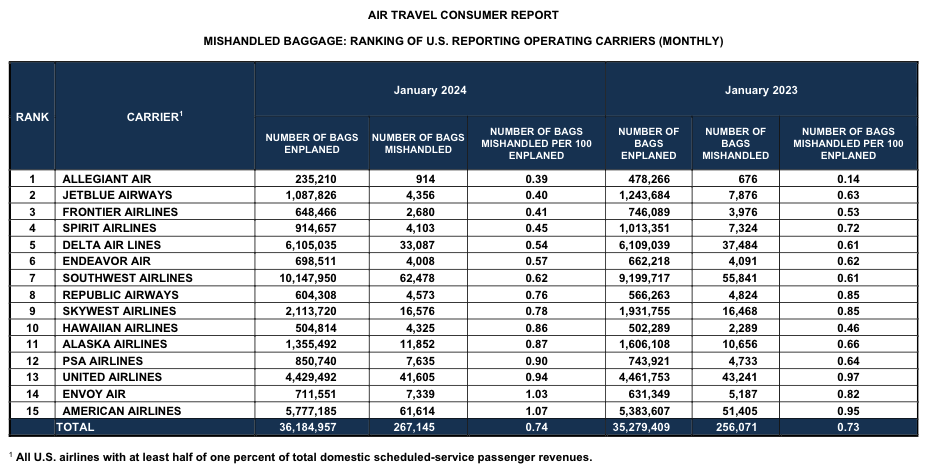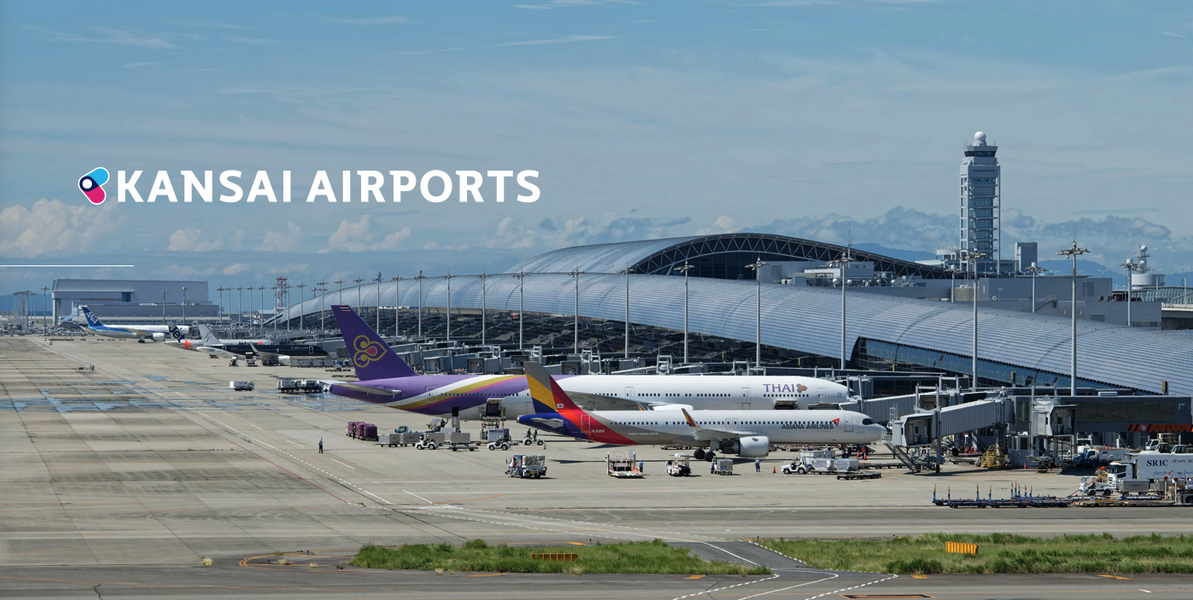Whether you have an iPhone or an Android device (yep, Android finally has a decent “tag” device), you can “tag” your checked bags until the cows come home. And whether you do or not, there’s an unfortunately decent chance that, in the U.S., your airline is going to mishandle (read, lose or demolish) your checked bag.
How much of a chance? In just the month of January 2024 (the most recent findings), an average of 0.74% of bags (267,145) were mishandled. That’s over 11,000 more pieces of mishandled bags over the same time from a year earlier. If you multiply that 267,145 by 12 months of the year, it puts them on a course of an average of losing over 3 million bags this year. But maybe we’ll get lucky and they’ll start to do better.
Here are the numbers from transportation.gov, March, 2024:

Things are bad all over
Airlines and airports in the U.S. are, of course, something of a hot mess. But they’re not the only guilty party. From birminghammail.co.uk, reporting on Europe and other areas in February 2024:
Between 2018 and 2022, Ryanair was the worst airline for lost baggage on flights to and from the UK, according to figures collected by bag storage company Bounce. The budget carrier accounted for 12.77% of lost cases, followed by Iberia at 8.85%, Vueling at 6.59%, Royal Air Maroc at 5.66% and Qatar Airways at 5.12%.
And yet, despite the hot mess of lost checked bags, one commercial airport has not lost even one bag since it opened in September 1994.
Things are great at one airport
 According to Nikkei Asia, Kansai International Airport (KIX) near Osaka, Japan has reported an accomplishment that other international airports can only dream of achieving. They have never lost a single piece of passenger luggage since the airport opened in September 1994. Oh, and to give an example of their current numbers, the airport handled about 10 million bags in 2023 alone.
According to Nikkei Asia, Kansai International Airport (KIX) near Osaka, Japan has reported an accomplishment that other international airports can only dream of achieving. They have never lost a single piece of passenger luggage since the airport opened in September 1994. Oh, and to give an example of their current numbers, the airport handled about 10 million bags in 2023 alone.
According to the airport authority, KIX’s amazing success in never losing a bag in nearly 3 decades is thanks to multilayered system to checking and, well, being careful. Only 2 or 3 staff members are responsible for each aircraft’s complete cargo area. That means there are fewer humans involved in the process, as well as more staff ownership of those pieces of luggage on their journey through the airport.
“It’s important for multiple staff members to share information to prevent mistakes arising from erroneous assumptions,” Tsuyoshi Habuta to Nikkei Asia. Habuta supervises baggage operations at CKTS, the airport’s primary ground/baggage handling company.
When a plane arrives as KIX, if the number of unloaded baggage items is different from the number loaded at the origin airport, CKTS staff immediately inspects the cargo hold the the belly of the plane, the parking apron around it, and the airport’s luggage sorting area, to locate the bag.
Not only that, but the airport, through CKTS, promotes a goal of having every bag from every arriving aircraft to the baggage claim area within 15 minutes following an aircraft’s arrival. Why? To keep passenger stress to a minimum. FIFTEEN MINUTES! Take THAT, Alaska and Delta!
And on top of that, CKTS employees are trained to place suitcases on conveyor belts so that their handles face outwards toward the passengers. This saves them time and reduces inconvenience.
CKTS employees are also told to wipe down any suitcases that might have gotten wet in the rain. Oh, and if there’s a damaged item like a musical instrument or baby stroller, the employee has to take responsibility and personally give it to the passenger.
I’m totally having airport envy, how about you?
Why is this a big deal?
Besides the obvious – a nearly 30-year history of not losing checked bags shows that you’re reliable and operationally efficient – Osaka is scheduled to host Expo 2025 from April through October 2025. They expect to have roughly 28-30 million visitors, 3.5 million of which will be arriving from other countries. Officials want visitors to expect they’ll arrive at one of the world’s best-run airports, which is run on efficiency and reliability.
Efficiency and reliability indeed!
Want to comment on this post? Great! Read this first to help ensure it gets approved.
Want to sponsor a post, write something for Your Mileage May Vary, or put ads on our site? Click here for more info.
Like this post? Please share it! We have plenty more just like it and would love it if you decided to hang around and sign up to get emailed notifications of when we post.
Whether you’ve read our articles before or this is the first time you’re stopping by, we’re really glad you’re here and hope you come back to visit again!
This post first appeared on Your Mileage May Vary

1 comment
This is one of the reasons why you see so many more people checking bags and not carrying on rollerbags in Japan. It’s shocking in comparison to the US when I see a widebody full of people on a domestic flight and the overhead bins are rather empty.
You can even hand the agent a paper bag full of gifts, they’ll wrap it in plastic, put it on a tray, put another tray over it to cover, and send it on its way. At your destination, they’ll either set it to the side or put it on a cart with similar goods and have a staff member wait with it at the baggage claim area.